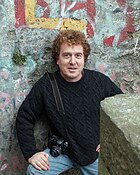David Eppstein
David Eppstein | |
|---|---|
 | |
| Born | David Arthur Eppstein 1963 (age 61–62) |
| Citizenship | |
| Alma mater | Stanford University Columbia University |
| Known for | Computational geometry Graph algorithms Recreational mathematics |
| Scientific career | |
| Fields | Computer science |
| Institutions | University of California, Irvine |
| Doctoral advisor | Zvi Galil |
David Arthur Eppstein (born 1963)[1] is an American computer scientist and mathematician. He is professor of computer science at University of California, Irvine. He is known for his work in computational geometry, graph algorithms, and recreational mathematics.
Biography
Born in England of New Zealander parents, Eppstein is a United States citizen. He received a B.S. in mathematics from Stanford University in 1984, and later an M.S. (1985) and Ph.D. (1989) in computer science from Columbia University, after which he took a postdoctoral position at Xerox's Palo Alto Research Center.[2] He joined the UC Irvine faculty in 1990, and was co-chair of the Computer Science Department there from 2002 to 2005.[2]
Research interests
In computer science, Eppstein's research is focused mostly in computational geometry: minimum spanning trees, shortest paths, dynamic graph data structures, graph coloring, graph drawing and geometric optimization. He has published also in application areas such as finite element meshing, which is used in engineering design, and in computational statistics, particularly in robust, multivariate, nonparametric statistics.
Eppstein is a current Editorial Board member for the Chicago Journal of Theoretical Computer Science.[3] He has been an associate editor of the journal ACM Transactions on Algorithms[4], on the Editorial Boards of the Journal of Algorithms[5] and the SIAM Journal on Computing[6], and a guest editor on the Journal of Graph Algorithms and Applications[7]. Eppstein served as the conference program chair or co-chair for the ACM Symposium on Computational Geometry 2001, the ACM-SIAM Symposium on Discrete Algorithms 2002, and the International Symposium on Graph Drawing 2009[8].
Selected publications
- Eppstein, David (1999). "Finding the k shortest paths". SIAM Journal on Computing. 28 (2): 652–673. doi:10.1109/SFCS.1994.365697.
- D. Eppstein, Z Galil, GF Italiano, A Nissenzweig (1997). "Sparsification—a technique for speeding up dynamic graph algorithms". Journal of the ACM. 44 (5): 669–696. doi:10.1145/265910.265914.
{{cite journal}}: CS1 maint: multiple names: authors list (link) - N. Amenta, M. Bern, D. Eppstein (1998). "The Crust and the β-Skeleton: Combinatorial Curve Reconstruction". Graphical Models and Image Processing. 60 (2): 125. doi:10.1006/gmip.1998.0465.
{{cite journal}}: CS1 maint: multiple names: authors list (link) - M. Bern & D. Eppstein (1992). "Mesh generation and optimal triangulation" (PDF). Technical Report CSL-92-1. Xerox PARC. Republished in D.-Z. Du & F.K. Hwang, ed. (1992). Computing in Euclidean Geometry. World Scientific. pp. 23–90.
Books
- D. Eppstein, J.-Cl. Falmagne, and S. Ovchinnikov (2008). Media Theory. Springer-Verlag. ISBN 978-3642090837.
{{cite book}}: CS1 maint: multiple names: authors list (link)
Awards
Eppstein received the NSF Young Investigator Award (1992–1999),[9] and has also been awarded an NSF Graduate Fellowship (1984–1987).[2]
References
- ^ http://11011110.livejournal.com/profile
- ^ a b c "David Eppstein's Online Curriculum Vitae" (PDF). Retrieved April 9, 2008.
- ^ Editorial Board, Chicago Journal of Theoretical Computer Science. Accessed November 23, 2008
- ^ ACM Transactions on Algorithms, , front matter, vol. 1, July 2005, no. 1
- ^ Editorial Board, Journal of Algorithms, vol. 45 (November 2002), Issue 2, p. C02.
- ^ David Eppstein biographical profile. National Science Foundation Graduate Research Fellowship Program. Accessed November 23, 2008
- ^ Journal of Graph Algorithms and Applications, main web-page. Accessed November 23, 2008.
- ^ 17th International Symposium on Graph Drawing
- ^ NSF Young Investigator: Algorithms for Molecular Biology, Optimal Triangulation, Minimum Spanning Trees, and Geometric Optimization. National Science Foundation. Accessed January 9, 2010
External links
- "David Eppstein". Donald Bren School of Information and Computer Sciences, University of California, Irvine. Retrieved August 15, 2008.
- "David Eppstein Bibliography". The DBLP Computer Science Bibliography. Retrieved August 15, 2008.
- "Eppstein's Geometry Junkyard". Retrieved August 15, 2008.
- David Eppstein at the Mathematics Genealogy Project.
- Researchers in geometric algorithms
- American computer scientists
- Cellular automatists
- Graph theorists
- Academic journal editors
- University of California, Irvine faculty
- People from Irvine, California
- Columbia Engineering alumni
- Stanford University alumni
- Palo Alto High School alumni
- Naturalized citizens of the United States
- American people of New Zealand descent
- 1963 births
- Living people
- Graph drawing people
